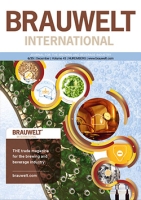Inadequate filter service lives invariably give rise to extensive discussions of the causes. When analysing the problems, reasons are mostly sought in the immediate surroundings of filtration. Filter systems, filter aids or process sequences are questioned.
Kieselguhr plate-and-frame filters, as depth filters, belong to the classical filtration systems. Due to their reliability and low operating costs, they are enjoying increasing popularity. Peripherals of the filter such as buffer tank units before and after the filter lines to absorb pressure surges, a correctly sized and properly located carbona-tion unit with integrated pressure holding valve, introduction of tangential flow technology in the frame filter, oxygen-free operation as well as an integrated draw-off tank to avoid yeast surges, all these components must be part of a complete filtration line. The actual filter run time is then approx. 19 to 21 hours.
Full utilisation of the PVPP filter is an added bonus, i.e.
....
The delivery of the two hundredth FS 130 type filter was an occasion for the author to highlight the salient criteria of this filter system. The main differences characterising the FS 130 in terms of design and process engineering are detailed in this article.
In the eighties, a non-uniform distribution of precoat and subsequent lay-down of kieselguhr cake manifested itself as a drawback in conventional filter systems. This resulted in considerable fluctuations of filtrate quality. The inlet distributor developed and patented at that time was designed to eliminate these irregularities by reducing turbulences in the filter inlet.
Inlet distributor for uniform precoat
This is a special design provided with holes (see Fig. 1).12 m/s is an added advantage.
....
"Fining" of a beverage should achieve the following three main objectives: pre-clarification of a beverage to increase filtration performance, removal of substances which might give rise to secondary haze formation, correction of flavour- and colour characteristics of a beverage by removing polyphenols responsible for same.
In beer fining, gelatine has a very complicated and complex double function: Clarification and stabilisation. These two functions can be fulfilled only by suitable edible gelatine when all aspects of beer fining are given due attention. This paper contains a detailed description of all relevant issues.
The IEP represents the value at which the gelatine molecule has a neutral net charge with reference to its surroundings. Type B has an IEP near pH 5....
PET and beer - an issue to be decided by the consumer. And a subject that is not to be crossed off the list on the part of breweries by simply deciding on a particular material. In a decision in favor of bottling beer in PET a variety of aspects are involved. This begins with the question of returnables or non-returnables, continues with the choice of material and leads to one component that has been accorded too little attention in spite of its primary significance: a suitable closure.
The better the bottle permeation values, all the more reason to adapt the closure to these values. In answer to this challenge, KHS of Dortmund, together with the well-known closure specialists Creative Closure Technology GmbH, has developed an optimal concept for plastic beer bottles.
....
In January, Anheuser-Busch’s Budweiser has returned to the supermarket shelves due to a contract signed between Anheuser-Busch and Brazil’s Expand Group, a large importer of beverages, including wines. Under the terms of the agreement, Budweiser will be imported from the US as well as from Argentina. In neighbouring Argentina the beer is produced under licence by a subsidiary of Chile’s CCU. At the end of December the Antarctica brewery’s production and distribution agreement with Anheuser-Busch officially ended. The termination of the contract had been announced in July nearly at the same time the Antarctica-Brahma merger was made public.
AmBev, the company formed by the merger of the brewers Antarctica and Brahma, has received a preliminary approval by Brazil’s regulatory body, the Finance Ministry’s Economic Monitoring Secretariat.
However, there are some restrictions: the closure of several breweries, the review of the licensing agreement between Brahma and Miller, the sale of the Skol brand. These restrictions were suggested to prevent AmBev’s three main brands to gain a market monopoly of more than 65% in the country’s regional markets. Antarctica and Brahma together produce 64 million hl of beer and 2.5 billion litres of soft drinks. AmBev lodged an official protest and is hopeful that it will receive the final regulatory approval without having to comply with the restrictions..


